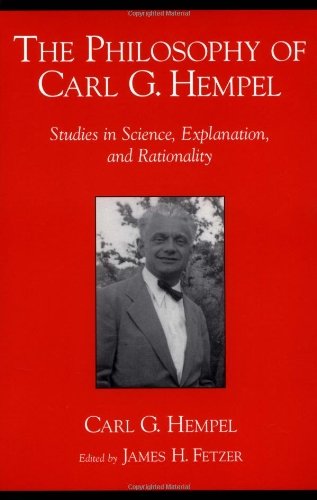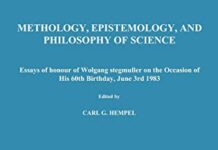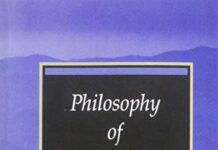
Ebook Info
- Published: 2001
- Number of pages: 464 pages
- Format: PDF
- File Size: 26.25 MB
- Authors: Carl G. Hempel
Description
Editor James Fetzer presents an analytical and historical introduction and a comprehensive bibliography together with selections of many of Carl G. Hempel’s most important studies to give students and scholars an ideal opportunity to appreciate the enduring contributions of one of the most influential philosophers of science of the 20th century.
User’s Reviews
Reviews from Amazon users which were colected at the time this book was published on the website:
⭐Carl Gustav Hempel (1905-1997) was a German writer and philosopher, who was a major figure in the movement of “Logical empiricism.”The editor’s Preface to this 2001 book states, “Perhaps the three most important philosophers of science of the twentieth century have been Sir Karl Popper, Carl G. Hempel, and Thomas S. Kuhn. Popper exerted the most influence upon natural scientists and Kuhn upon social scientists and public alike. But Hempel’s impact upon professional philosophers of science was unparalleled. His work… virtually defined the field… for decades… That his influence should long endure remains of crucial interest to philosophy. The papers included in this collection are intended to ensure that Hempel’s work on these central problems will remain easily accessible for students and scholars alike.”The editor’s Introduction explains, “[Hempel] advanced ‘deductive-nomological’ and ‘inductive-probabilistic’ versions to account for differences between subsumption by universal and by statistical covering laws. The differences between them, especially the peculiar difficulties generated by probabilistic explanations, would preoccupy much of his efforts over nearly two decades… The crucial problem turned out to be explaining the nature of the logical link between explanans and explanandum when the covering laws were not universal but statistical.” (Pg. xxv)Hempel states in the first essay, “But what are the grounds which sanction the acceptance of mathematics?… One of the several answers which have been given to our problem asserts that the truths of mathematics… require neither factual evidence nor any other justification because they are ‘self-evident.’ This view, however, which ultimately relegates decisions as to mathematical truth to a feeling of self-evidence, encounters various difficulties. First of all, many mathematical theorems are so hard to establish that even to the specialist in the particular field they appear as anything but self-evident. Secondly, it is well-known that some of the most interesting results of mathematics—especially in such fields as abstract set theory and topology—run counter to deeply ingrained intuitions and the customary kind of feeling of self-evidence. Thirdly, the existence of mathematical conjectures such as those of Goldbach and of Fermat, which are quite elementary in content and yet undecided to this day, certainly shows that not all mathematical truths can be self-evident.” (Pg. 3)He continues, “I have argued so far that the validity of mathematics rests neither on its alleged self-evidential character nor on any empirical basis, but derives from the stipulations which determine the meaning of the mathematical concepts, and that the propositions of mathematics are therefore essentially ‘true by definition.’” (Pg. 6)He outlines “the thesis of logicism concerning that nature of mathematics”: “Mathematics is a branch of logic. It can be derived from logic in the following sense: a. All the concepts of mathematics, i.e., of arithmetic, algebra, and analysis, can be defined in terms of four concepts of pure logic. b. All the theorems of mathematics can be deduced from those definitions by means of the principles of logic (including the axiom of choice). In this sense it can be said that the propositions of the system of mathematics as here delimited are true by virtue of the definitions of the mathematical concepts involved, or that they make explicit certain characteristics with which we have endowed our mathematical concepts by definition.” (Pg. 13)After explaining “the two covering-law models of explanation,” he asks, ”What is the scope of their applicability? Do they account for all kinds of scientific explanation? It seems to me that between them, they accommodate all the explanations typically provided by the physical sciences; at any rate, I am not aware of any explanation in this area that cannot be quite satisfactorily construed as an instance… of deductive or of probabilistic explanation as they are schematically construed in these models.” (Pg. 72-73)He states, “We can distinguish two major ways in which a statement may be accepted into K: ‘direct acceptance,’’ on the basis of suitable experiences or observations, and ‘inferential acceptance,’ by reference to previously accepted statements… Inferential acceptance may be either deductive or strictly) inductive, depending on whether the statement in question is logically implied or only more or less highly supported by the previously accepted statements. This schematic model does not require, then, that the statements representing scientific knowledge at a given time be true; rather, it construes scientific knowledge as the totality of beliefs that are accepted at a given time as warranted by appropriate scientific procedures. I will refer to this schematization as the ‘accepted-information model of scientific knowledge.’” (Pg. 122)He observes, “I must now add a quasi-metaphysical cautionary remark. I said earlier that a provisio pertaining to a particular application of a theory makes an ONTOLOGICAL claim to the effect that… there ARE no further factors present that are nominally relevant to… the outcome to be predicted. The provisio should not be construed as requiring only that, according to our current information, no other nominally relevant and thus potentially disturbing conditions are present. But what can be established in accordance with the methodological maxim I mentioned is at best that other than those factors specifically mentioned in the theoretical inference, no factors are present that current scientific theories acknowledge as nominally relevant to the outcome. This clearly is not an ontological claim, but an EPISTEMOLOGICAL one; it refers to our current scientific knowledge or, rather, to the set of currently accepted theories and particular statements.” (Pg. 247)He cautions, “The term ‘model’ can serve as a useful reminder that the two types of explanation as characterized above constitute ideal types or theoretical idealizations and are not intended to reflect the manner in which working scientists actually formulate their explanatory accounts. Rather, they are meant to provide explications, or rational reconstructions, or theoretical models, of certain modes of scientific explanation.” (Pg. 281-282)This book gives an excellent selection of Hempel’s writings; it will be “must reading” for anyone studying the philosophy of science.
⭐
Keywords
Free Download The Philosophy of Carl G. Hempel: Studies in Science, Explanation, and Rationality: Studies in Science, Explanation and Rationality 1st Edition in PDF format
The Philosophy of Carl G. Hempel: Studies in Science, Explanation, and Rationality: Studies in Science, Explanation and Rationality 1st Edition PDF Free Download
Download The Philosophy of Carl G. Hempel: Studies in Science, Explanation, and Rationality: Studies in Science, Explanation and Rationality 1st Edition 2001 PDF Free
The Philosophy of Carl G. Hempel: Studies in Science, Explanation, and Rationality: Studies in Science, Explanation and Rationality 1st Edition 2001 PDF Free Download
Download The Philosophy of Carl G. Hempel: Studies in Science, Explanation, and Rationality: Studies in Science, Explanation and Rationality 1st Edition PDF
Free Download Ebook The Philosophy of Carl G. Hempel: Studies in Science, Explanation, and Rationality: Studies in Science, Explanation and Rationality 1st Edition

